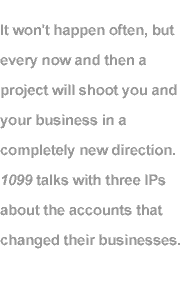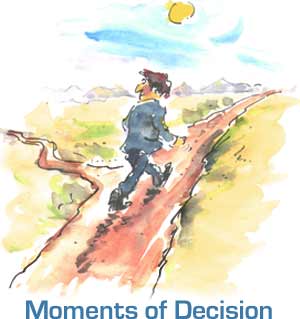 |
|
||||||||||||
 |
|
||||||||||||

|

|
|
By John P. Mello Jr. |
A mere business account will never jar you quite like your big date with the Grim Reaper will, but any account could change the way you do business -- or steer you into a new business altogether. For Larry Rothstein, the IP proprietor of Boston's Ran Associates, the project that jolted him into business for himself, altering his professional life forever, began with a book proposal. The time was 1985, and Rothstein's career lacked focus. He was working for a small calendar publisher in Hartford, Conn., when he decided to approach a literary agent in Boston about creating calendar tie-ins to some of her authors' books. The agent, who not long before had been uncertain about her own career path, told Rothstein at their meeting that he might make a good literary agent himself, and offered to help him get started. He took up the invitation and began discussing book concepts with friends, one of whom knew writer Joan Borysenko. Nine months later, Rothstein and Borysenko had completed a proposal for the book that would become Minding the Body, Mending the Mind (Bantam Doubleday Dell, 1993). "I was learning as I was doing it because I had never done a book proposal before," Rothstein says. The duo found a publisher for the manuscript -- a publisher who wanted it in only three months. "They got it in four," Rothstein says. "It wound up on the New York Times bestseller list." The book's success propelled Rothstein into a career as a book packager, a person who helps writers to develop book ideas and proposals. "I got the sense that I could find people, take their ideas and make them into a good book," says Rothstein. "The Borysenko thing validated that I had the skills to work with people and make a book happen." Lemons into Lemonade A successful account like Rothstein's might well embolden a would-be IP to take the leap into full-fledged self-employment, but disappointment can be equally compelling. Take the case of management consultant Peter Cassidy of Cambridge, Mass.: Cassidy founded his solo business, Triarche Research, after a confrontation with a former client revealed just how much his skills were worth. At the time of the episode, Cassidy was dividing his time between freelance journalism and technology writing. A high-tech research firm that had subcontracted work to Cassidy in the past offered to pay him $17,000 to conduct a survey. Cassidy estimated the amount of work he'd have to put into the project, determined that $17,000 wasn't enough, and turned down the offer. The company went ahead with the survey anyway, of course, and when it was released, Cassidy discovered that more than a third of it had been cribbed from a previous project he had done for the firm and for which he'd been paid only $8,000. Adding insult to injury, Cassidy also learned that the firm had made $250,000 on the new survey. "I foamed at the mouth when I found out about it," he says. "I had to throw away the suit I was wearing." Thereafter, Cassidy vowed to curtail his subcontracting work. "I decided to only be a subcontractor in situations where the book was open, where I knew what the prime-contractor was getting," he said. "That's very important. A lot of places won't do that. I think subs should walk the minute they hear, 'We don't open the books.'" Cassidy's next move was to become a prime-contractor who works directly with companies. (He also curtailed his journalism activities: "There's no money in it," he says. "Per word, you're making as much now as you did in the '70s, while in the research space the money seems to be going up. A lot of research firms are out there, and they're not being paid licorice. I might as well be capturing some of that money.") Never Say Never Prior to his pivotal account, human resources consultant Bob Gately of Hopedale, Mass., worked strictly on a pay-for-services basis. "When I first entered the hiring consulting business, I was very reluctant to give away my product," he said. That changed in 1992, when Gately collided with a potential client who resisted his usual sales pitch. The would-be client, a national job placement firm, was planning to expand, and wanted to hire someone to make sure its new hires would be as good as the best people in its current workforce. At first, says Gately, "I just couldn't get them to try me." So he took a different tack: he offered the firm a "satisfaction guaranteed" contract: Gately agreed to test five of the firm's current employees for $135 each; if the client saw no benefit from the tests, it wouldn't have to pay. "Let me get this straight," the client's incredulous representative told Gately. "You're going to do the testing. You're going to do the scoring. You're going to debrief me. And then I get to decide whether or not I'll pay you?" "That's right," Gately answered. "Then I need seven of them tested," said the representative. "That change in the way I did business has been very rewarding," Gately says. "It made me realize that [previously] I was asking people to risk their money, but I wasn't willing to risk anything in return." The approach itself sounds risky, but Gately says that "most clients see the value of what I do and don't ask for a risk-free trial." Broaden Your Horizons Brad Paul's pivotal account helped him to realize that, as a middleman between urban developers and inner-city neighborhoods, he had more potential clients than he thought he did. An urban activist and former deputy mayor for housing of San Francisco, Paul had spent much of his life crossing swords with corporate types hell-bent on bulldozing houses to make room for commercial buildings. In 1991, when he established his consulting business, he thought his only clients would be community groups resisting the juggernaut of development. At first his clients were, indeed, mostly non-profit organizations. Then -- out of the blue -- Paul received a call from an executive at a subsidiary of Bechtel, a large international corporation. The executive wanted Paul to work with him on a real estate project for a local law school. The law school was resurrecting old plans to raze residential housing on a university-owned block in the city's Tenderloin District to make room for a municipal courthouse where the law school's students would have special privileges. Naturally, neighborhood residents opposed the project: not only would it scotch housing, but the law school's representatives seemed callously indifferent to community concerns. Paul was stunned that the courthouse project had resurfaced at all: in 1987, as director of a non-profit community group called the North of Market Planning Coalition, he had torpedoed it. Says Paul, "The school's attitude was, 'We're part of the University of California; we don't have to follow local law; we don't need your permission to do anything.'" Paul was also surprised to be called upon by Bechtel, which was hardly one of the non-profit civic organizations he'd been advising up to then. Paul explained his antagonistic relationship with the law school to the Bechtel executive, who -- unbeknownst to Paul -- had met with community leaders and already knew the score: "I know all about it," he said. "That's why I called you." At first, mention of Paul's name elicited squeals of protest from the law school, but the executive told them, "Tough. This is the person I want to hire, because he's the only person who's going to have any credibility in the community." Eventually the law school relented and Paul became a liaison between the school and the community, helping to hammer out a plan for the project that satisfied both parties. "The account meant a lot to me because this executive was such a decent guy and so fair minded," says Paul. "I began thinking that I didn't have to work just with government agencies and non-profit groups. I could work for corporations because there are other people out there like him. Since then I've worked for a number of large corporations and have had the same experience." For Paul, Cassidy, and Rothstein, change was good. Maybe one of your current projects is the one that will shoot your business in a whole new direction. |
|
|
| ||
|
June 21, 1999 Edited by Eric Gershon Illustration by Evzen Holas Production by Keith Gendel |
We'd love to hear your comments about this article! John Mello writes on a variety of business and technical subjects from his home in Woonsocket, R.I. His last story for 1099 was "Naming Your Business." | |
| ||